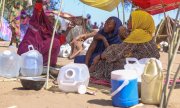Massacre in Sudan - why is the world just watching?
El-Fasher, capital of North Darfur State in Sudan, is in a catastrophic state following its capture at the end of October by RSF militia. There are reports that the RSF has murdered at least 1,500 civilians there within just three days, with more than 460 killings having been carried out at a hospital, according to the World Health Organisation. European media take the international community to task over its inaction.
Cold calculations driven by geopolitical interests
Deliberate decisions have ensured that this war doesn't receive enough attention, writes Público:
“In the heart of Africa, a country exhausted by decades of dictatorship, coups and civil wars is now experiencing a humanitarian disaster of epic proportions - and the world, complicit through its inaction, is watching in silence. ... The horror in Sudan cannot be explained solely by the barbarity of its warlords. It can also be explained by the silence of those who could act but do not. It can be explained by the cold calculation of powers that measure human life in terms of geopolitical utility. It can be explained by a paralysed UN, a distracted Europe and an abandoned Africa.”
You can't end wars by looking away
A global superpower such as the US can't afford to turn its back on the region, The Times argues:
“In the notable absence of the US, the UAE thinks it has an opening to develop a network of ports, including Port Sudan, on the Red Sea and along the crucial maritime choke points and staging posts of Africa's coastlines. It has the military, the tech and the cash. Ending the war early could thwart that ambition. The essential problem, though, remains a sense in the White House that some distant wars do not matter and that declaring them irrelevant will make them go away.”
Business comes first for EU
Europe continues to do business with the United Arab Emirates, which according to observers provides military support to the RSF militia, De Volkskrant columnist Ana van Es complains:
“Trade relations with the Emirates carry more weight than mass murder in Sudan. Last spring, a few days after hundreds of women and children were killed in the Zamzam refugee camp near el-Fasher, Europe began negotiating a free trade agreement with the Emirates. ... European Commission President Ursula von der Leyen evokes 'shared values' and 'common priorities' between the EU and the Emirates. The negotiations are continuing despite the war in Sudan. Apparently a good deal outweighs the fact that the desert is actually turning red.”
Nothing being done to prevent further partition
The international community talks about Sudan but does nothing, Le Monde observes:
“Unfortunately, none of the major powers that officially express concern about the fate of the Sudanese people have ever held those responsible for the chaos to account. ... The inability of the countries that met in Washington on 24 October [the US, Egypt, Saudi Arabia and the UAE] to take any concerted action while the fate of el-Fasher was still undecided is all the more shocking. None of the forces present are pointing to the danger of further partition of the country following the secession of South Sudan in 2011. Without negotiations, however, the logic of a war in which neither side gains the upper hand will inevitably lead to this outcome.”
The murderers have a free hand
Tages-Anzeiger criticises the passivity of the international community:
“Since diplomatic priorities are focused entirely on the Middle East and Ukraine, nothings suggests that the RSF will be worried about the United Nations being 'deeply alarmed' by the events in el-Fasher. RSF commander Mohamed Hamdan Dagalo knows that nobody will intervene militarily in this remote part of the world to try to punish war crimes. ... There is a great danger that what the RSF militia did in Junayna in West Darfur, where thousands of people were presumably killed because they belonged to a certain non-Arab ethnic group, will be repeated on a much larger scale in el-Fasher.”
Put pressure on arms suppliers
The international community must take concerted action, Tagesschau.de urges:
“Trump's method - exerting maximum pressure on the parties directly involved in the war - could help to achieve a ceasefire. But further steps must then be taken by the United Nations, the European Union and the International Criminal Court. The pressure on arms suppliers such as the United Arab Emirates must increase - also by means of public exposure: when people think of Abu Dhabi and Dubai, it should not just be Formula 1 and chocolate that come to mind, but also the children killed in Darfur.”

